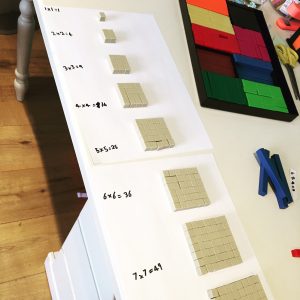Does your child struggle with Dyscalculia — or feel lost in maths?
I specialise in deep, personalised tutoring that rebuilds number sense from the ground up. No tricks. No exam prep. Just calm, logical repair using beautiful visual models, tactile objects (called manipulatives), and multi-base place-value logic.
I’ve spent thousands of hours helping children untangle fear, confusion, and shallow shortcuts — and recover real confidence. If your child has been labelled, misunderstood, or left behind, this may be the turning point.
Can students learn maths despite Dyscalculia?
Yes — absolutely. Every single committed student I’ve ever tutored has made real progress in maths, no matter how severe their learning difficulties.
Many struggle deeply with number sense, confidence, or anxiety. These are the students I love teaching most. Supporting them is an intense intellectual and emotional challenge that draws on everything I’ve built: my engineering mindset, my pedagogical depth, and my human connection.
Progress is always possible. But fluency and confidence can’t be rushed. Many students arrive carrying years of shame or confusion — sometimes without even a stable sense of what “five†looks like. My job is to meet them where they already feel safe and successful, and rebuild from there. That process begins with carefully chosen manipulatives, grounded in rock-solid pedagogy and multi-modal methods.
But no matter the age, one thing is certain: the longer Dyscalculia goes unaddressed, the deeper the damage to confidence and self-belief.
That’s why online tutoring can be a lifeline. The screen creates a safety buffer — reducing pressure and making space for genuine breakthroughs. With the right starting point, a clear trajectory, and measured, deliberate instruction, I help students get truly unstuck — often for the first time in their lives.
In 2015, I became the first tutor to pioneer dyscalculia teaching online. What began as an experiment is now a well-honed craft. Over thousands of hours, I’ve refined the art and science of teaching this subject remotely — with precision, empathy, and results. Since then, the methods I developed have quietly spread across the tutoring world. What was once considered impossible — teaching dyscalculia effectively through a screen — is now common practice. But the difference remains: I didn’t follow a trend. I built the foundations others now stand on.
The short video below offers a glimpse into one of my earlier online training sessions — in conversation with Catherine Eadle, one of the co-founders of the Dyscalculia Network. Years before online dyscalculia tutoring became widespread, I was refining these methods, learning from others, and shaping my own. What began as collaboration and inquiry has since become mastery — and a remote teaching approach that now echoes across the world.
Delivering high quality tutoring for Dyscalculia online is intellectually demanding, requiring the perfect blend of teaching and technical expertise in using remote teaching as a powerful teaching tool in itself. I train up tutees to feel comfortable on camera and use BitPaper whiteboard within minutes of our first session.
The understanding of Dyscalculia is approximately 30 years behind the understanding of Dyslexia and unfortunately many don’t even realise what the term is.
According to The Dyscalculia Solution by Patricia Babtie, Dyscalculia is:
- A deficit in the core capacity to process numbers.
- Inability to compare and enumerate small quantities, leading to difficulty acquiring basic numeracy.
Dyscalculia video conversation with another specialist
Dyscalculia vs “being bad at maths”
Dyscalculia is about lack of number sense, and understanding the relationships using numbers. It should not be mixed up with being “bad at maths”. Maths covers a wide range of topics but Dyscalculia affects fluency in basic arithmetic skills and number sense. Since most of the other disciplines of maths require some number sense, Dyscalculics struggle with maths in general. See video in the links section below for more information.
The variation between those who have Dyscalculia or Dyscalculia like tendencies is very wide indeed. On one hand I have had students who don’t know instantly what the double of 2 is or 3+2 is, and on the other hand I have had students who thought they had Dyscalculia but really they were fluent with arithmetic and needed help with the other higher level aspects of maths.
The role of maths anxiety – An in depth conversation
My Dyscalculia related training
- Dyscalculia and Mathematical Difficulties workshop by Steve Chinn, Mahesh Sharma and Judi Hornigold for The British Dyslexia Association – London (June 2019)
- Making maths memorable, lessons from Cognitive Science – Teacher training course (2018)
- Multiple representations in mathematics – Teacher training course (2018)
- Concrete, Pictorial, Abstract and Language methods in maths teaching – Teacher training course (2018)
- Singapore Maths and Dyscalculia – The Perfect Match? Workshop by Judi Hornigold, Maths Conference Birmingham (2017)
- Dyscalculia and Numeracy Difficulties – Workshop by Patricia Babtie for The Tutors’ Association (2015)

Useful Links for Parents and Students
- A parent’s guide to Dyscalculia – Video by Ronit Bird
- Being bad at maths vs Dyscalculia – Video by Professor Brian Butterworth
- On the “Labelling” aspect of Dyscalculia – Blog post by Professor Brian Butterworth
- Every single child can pass maths – Blog post by Mark McCourt
- Weaker pupils or the wrong maths? – Blog post by Mark McCourt
- Tutoring children with Dyscalculia online – My post for the Pearson Special Needs Blog
